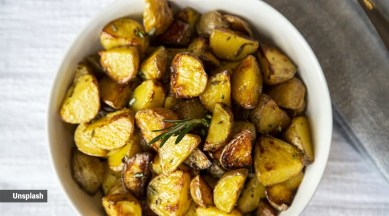📣 For more lifestyle news, click here to join our WhatsApp Channel and also follow us on Instagram
Nutrition alert: Here’s what a 100 gram serving of potatoes contains
According to Aruna Mallya, Senior Dietitian, Nutrition and Dietetics Department, KMC Hospital, Mangalore, potatoes are good sources of carbohydrates and starch

Potatoes might be the only vegetable nobody in the family has ever objected to eating. It might not be your favourite but you won’t hate it either.
These edible tubers are available throughout the world all year round. According to Aruna Mallya, Senior Dietitian, Nutrition and Dietetics Department, KMC Hospital, Mangalore, potatoes are a good source of carbohydrates and starch.
monthly limit of free stories.
with an Express account.
“Low in protein, it has a good amount of ascorbic acid, energy, and they also enhance the taste, regardless of which curry it has been used in,” she says. Because it goes well in any curry, potatoes are liked by many people worldwide, Mallya adds.
So, here’s a holistic profile of potatoes — from health benefits to things you should be keeping in mind while eating potatoes — we have covered it all for you.
Nutritional profile of potatoes
According to Mallya, a 100 gram (gm) potato serving has the following nutritional properties:
Protein: 1.35 gm
Carbohydrate: 12.90 gm
Fibre: 1.69 gm
Thiamine: 0.05 mg
Riboflavin: 0.01 gm
Niacin: 1.3 mg
Ascorbic acid: 6.41 mg
Carotenoids: 224 mg
Magnesium: 22.3 mg
Manganese: 0.16 mg
Phosphorous: 37.90 mg
Potassium: >200 mg
Sodium: 3.97 mg
Zinc: 0.3 mg
Health benefits of potatoes
Provides a lot of energy: Potatoes have more starch than other vegetables, hence they give more energy, Mallya explains.
Promotes heart function: Mallya says that because potatoes are a good source of potassium, they help in the smooth functioning of the heart. “At the same time, it should be avoided if serum potassium levels are high, especially in heart and kidney diseases,” she adds.
Improves digestion: When cooked with its skin, the resistant starch in potatoes improves digestion and overall health.
Protects against scurvy: Mallya says potatoes have moderately high ascorbic acid levels and vitamin C. The latter is an antioxidant, which helps in protecting against scurvy.
Helps gain weight: Eating potatoes is beneficial for people looking to gain weight and increase calories, Mallya says. “Especially for people whose Body Mass Index (BMI) is below normal. It is used as a substitute for cereals and breakfast in the form of jacket potatoes,” she says.
Can diabetics consume potatoes
Because the glycemic index of potatoes is more than 70, which is considered high for people who need strict control over blood sugars, it is recommended for diabetics to stay away from it.
“They can, however, be used in a restricted amount or small portion (50 gm/day) if blood sugar levels are well controlled,” Mallya says.
People who know how to count carbohydrates efficiently substitute potato in place of other cereals and use it in moderate quality, she explains.
Consuming low glycemic index foods is always beneficial if a person is diabetic because blood sugar levels can be well maintained and they can avoid unnecessary consequences of diabetes.
Are potatoes beneficial for pregnant women
To increase the calorie intake, especially during the second and third trimesters, potatoes can be used in curries, as well as in breakfast instead of fried foods, as potatoes have fibre content in them, Mallya says.
Sometimes, during pregnancy, Mallya explains, women develop hyperglycemia or gestational diabetes, in which case maintaining the blood sugar levels within the limits becomes important in order to avoid complications.
Things to keep in mind while eating potatoes
Over consumption leads to an increase in calories, according to Mallya, thereby increasing the BMI or causing overweight or obesity. So, steer clear of potatoes if you’re trying to lose weight.
Over-eating potatoes causes bloating in most people. “Using ginger, carom seeds, jeera seeds, garlic, asafoetida and mint leaves subsides the symptoms,” she says.
Myths and facts about potatoes
A common myth that surrounds potatoes is that the green colour on the skin is toxic for humans and it is actually a fact, Mallya says. “It indicates a toxin called solanine. Cooking doesn’t destroy the toxin, so better to remove the entire part which is green and use the rest of the potato. Eating it may make a person ill,” she explains.
If you think cutting off potatoes from your diet entirely can help you lose weight, you’re in for a surprise. “Cutting down calories from potatoes is just a part of the diet and along with it, daily exercise matters if you are looking for weight loss,” she says.
Along with potatoes, you need to eat a balanced diet, add fats in moderation, exercise, and eat enough fibre too, Mallya says.
📣 For more lifestyle news, follow us on Instagram | Twitter | Facebook and don’t miss out on the latest updates!
📣 For more lifestyle news, click here to join our WhatsApp Channel and also follow us on Instagram